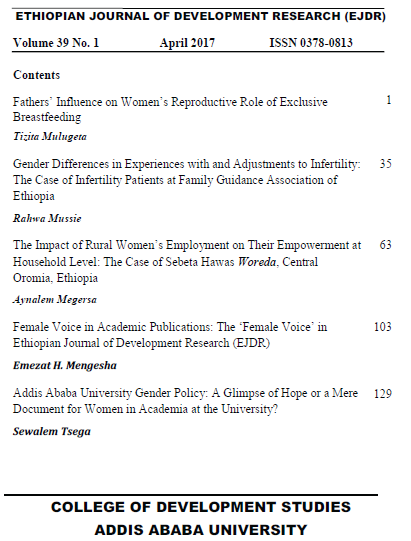Fathers' Influence on Women's Reproductive Role of Exclusive Breastfeeding
Keywords:
Exclusive breastfeeding, fathers’ support, parental support, women and breastfeedingAbstract
Early and exclusive breastfeeding (EBF) increases gender equality by
providing the best and equal start for all children, boys and girls alike,
irrespective of levels of family income (Black ƒQƒTƒR ƒXƒ]ƒp 2008). Despite the
numerous benefits of EBF, many countries did not yet develop sound
breastfeeding practices beyond identifying barriers for its low rate of practice.
This study, conducted in Menagesha ƒxƒVƒ\ƒQƒiƒX, attempted to examine factors
that affected fathers¡¦ involvement in EBF and its impact on women¡¦s
reproductive right and productive work. The Woreda serves as a place for
many flower farms, where most rural women get job opportunity. The study is
a qualitative one based on inƒ¯depth interview, focus group discussion (FGD)
and key informant interview. A total of 30 key informants and 2 FGD
participants were involved in the inƒ¯depth interviews and discussions. Key
informants from the health sector and flower farms were also part of the data
source. Findings showed that there was very low understanding of the concept
and application of EBF among mother and father informants. However, the
study identified that there was a positive impact on duration of breastfeeding
when fathers showed emotional and financial support. Though the need for
fathers¡¦ support was recognized by study participants, the existence of
traditional gender division of labour (men seen only as guardians or providers
of the family), and lack of attention towards men¡¦s role in EBF by health
centers negatively impacted men to be change agents. In addition, lack of EBF
friendly facility in work place, lack of legal protection and job security were
also found as barriers to working women from enjoying their reproductive
right of EBF, parallel to maintaining their productive work. These results
suggest that men focused intervention by health centers and media, and also
women¡¦s reproductive right based adjustment in work areas may help to
change the existing low rate of EBF practice and allow women to enjoy their
reproductive right parallel to their productive work.

